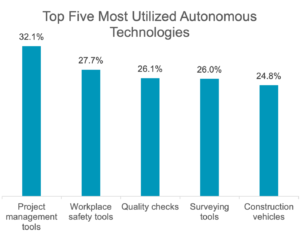
Construction embracing autonomous tech, but disconnects exist
By Adam Freill
Construction SoftwareHexagon’s Autonomous Construction Tech Outlook report suggests opportunities exist for even greater bottom-line impact from technology.
Eighty-four per cent of technology decision-makers at general contracting firms have adopted some form of autonomous technology in the past year to help address key business challenges, and most plan to spend more on automated technology in the coming three years.
Yet despite the strong adoption and investment numbers — More than half plan to spend between US$5 and US$15M — technology provider Hexagon says that a disconnect in the industry’s understanding of the technology, its application and benefits will hinder optimization if not addressed.
That was a key finding as the company polled more than 1,000 senior executives from across North America, the United Kingdom and Australia for its Autonomous Construction Tech Outlook report.
The study shows that construction firms are turning to technology to help mitigate and manage challenges, many of which have been exacerbated by the economic instability of the past few years. Notably, respondents cited operational issues including supply chain, productivity/efficiency, and labour shortages as the most pressing challenges near-term, while driving new business/growth and managing ESG regulations and programs were ranked as top concerns over the next three to five years. More than 80 per cent of global respondents stated that their top three challenges represent a “moderate to significant” bottom-line impact on their business.
The survey also indicated that the industry is looking at autonomous technology as one of the most promising solutions.
“Construction firms are turning to autonomous solutions to mitigate risks better and improve the effectiveness of operations, which are both key to overcoming the productivity, sustainability and profitability issues they face every day,” said Thomas Harring, president of Hexagon’s Geosystems division. “Progressive firms, which are adopting autonomous solutions at a faster rate and in more areas of their business than their competitors, know that this technology does a lot more than automate tasks.”
He explained that these digital solutions can be leveraged to make jobsites safer and more efficient, while managing the gap that exists between data created from a project and the data actually used to find meaningful insights and generate opportunities.
“This is just the tip of the iceberg,” he explained. “Autonomous technology is transformative technology that will define the next era of construction. The key right now is to help the industry leverage technology in a way that ensures optimization and lasting, scalable results.”
Survey results show the types of autonomous technology used among construction firms varies greatly — from software and tools to self-driving construction vehicles and robotics — as does the level of autonomy.
Project management was cited as the most popular application (32%) followed closely by workplace safety (28%), quality control (26%), surveying (26%) and vehicle operation, document management and verification/project inspection (all at 25%).
Among the autonomous technologies used, almost half are partially or conditionally autonomous (requiring human oversight and/or intervention to complete tasks).
Interestingly though, even with a wide variety of solutions available, firms appear to have trouble identifying the best autonomous or automated technology to solve their specific challenges and pain points.
For instance, among survey respondents who stated that improving supply chain management is a top priority, only 28 per cent reported an investment in autonomous monitoring technology, one of the top reported technologies that aid in this area.
Additionally, 37 per cent of respondents cited fully autonomous robotics to drive sustainability benefits as a leading priority in the next 3 to 5 years, yet only 17 per cent are investing in this type of technology.
This, says the company, indicates that while construction firms are reporting clear benefits across key business areas, their use of autonomous solutions is not always aligned to their most pressing challenges. The company says this represents a significant opportunity to help firms better address specific challenges and pain points through more targeted autonomous technology adoption.
“The firms that will redefine this industry are no longer defining themselves as construction companies but rather as hybrid companies with technology, engineering and construction at their core — and autonomous technology will play a major role in this evolution,” said Harring. “Companies are already seeing how autonomous technology can improve collaboration and streamline production, but the even greater value comes from its ability to help businesses accelerate innovation while maintaining business resiliency.”





